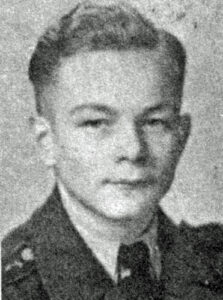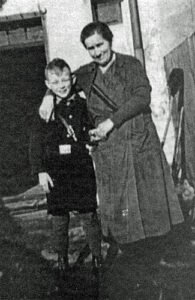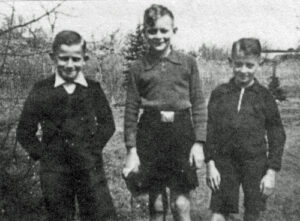Mail Correspondence with Soldiers at War (“Feldpostbriefe”): Letters from 16-year-old member of the German “Volkssturm” Georg Spieler to his family in 1945 (Published on 14/01/2024)
Feldpostbriefe and their significance today
When researching Julius Erasmus, one inevitably comes into contact with letter correspondence between soldiers at war and their families from the time of the Second World War, such correspondence being called “Feldpostbriefe” in German. Be it messages about the death of a soldier, written by his superior to his relatives, which were later sent to Mr Erasmus as a hint for a grave search, or other correspondence between soldiers at war and their families at home. Since then, I have also been dealing more closely with field post letters from that time.
Feldpostbriefe are valuable contemporary documents that unfold their timeless message, especially in times like the present, and convey a vivid impression of what war means to all involved. They are a valuable tool to ward off the very beginnings of a renewed striving for war and perhaps to help prevent history from repeating itself once again and with yet more gruesome consequences for mankind. At present, war, weapons and the killing of people on a large scale are once again being drummed up forcefully, although for decades one could have had the vague hope that mankind had finally learned its lesson to some extent from the painful experiences of two world wars in particular. Unfortunately, this does not seem to be the case once again.
With this in mind, appropriate letters or letter excerpts from various sources will be published here from time to time in the section “Mail Correspondence with Soldiers at War (Feldpostbriefe)” as a reminder of what war means to man and mankind. To provide food for thought and in the unshakable hope that this may make a difference.
The effects of political indoctrination on children and young people
Among the most harrowing evidence of what political propaganda is capable of are letters written by young German soldiers during World War II, such as those already published on this blog (see, for example, the letters by Franz Krügner or Adelbert Rühle). Exposed from childhood to “education” in the sense of the prevailing ideology, they had internalized the latter so deeply that they could often hardly wait to become soldiers and to be allowed to make their contribution to the realization of the goals that were conveyed to them as having no alternative. Even until shortly before the end of the war and despite the obvious signs of defeat, they sometimes fanatically clung to the slogans they had been taught throughout their lives, often to their deaths.
The Feldpostbriefe of Georg Spieler
One such example are the letters that the 16-year-old Georg Spieler wrote to his parents as a member of the so-called German “Volkssturm” in January 1945. The formation of the “Volkssturm” was based on a decree issued by Hitler on 25 September 1944, in which all 16 to 60-year-olds “fit to bear arms” were obliged to “defend the homeland with all weapons and [suitable] means” in order to “strengthen the Wehrmacht”. While most of the members of this formation, also known as the “last contingent”, were by no means “fit to bear arms”, its young members in particular had often deeply internalized the political motto of “fanatical fighting” that had been drilled into them from an early age. Many lost their young lives senselessly before they had really begun.
Georg Spieler was one of them. The statements in his letters speak for themselves:
Letter to his parents (source: Volksbund Deutsche Kriegsgräberfürsorge, Letzte Lebenszeichen II – Briefe aus dem Krieg, p. 180 ff. [translation from German language]):
„Breslau, 15/01/1945
Dear parents!
I received your kind letter with many heartfelt thanks.
Dear Mum, it will hardly be possible for Christa [a friend] to come and visit me again now, because she will soon be employed at the military unit. Shortly [I] will be sent to Wiesegrade for a while to conduct courses for paramedics, then I’ll be discharged and called up to the R.A.D. [Reich Labor Service]. So now, until I’m 29 years old, I will only come on visits. It may sound a bit harsh, but the life to come will be all the easier for me. Praise be to the hard done by; we are, that is to say, I am a son from the Spieler family, of the Spielers everyone has done so well and so badly so far, even if it has not been easy at times. I’m fully aware that life is a struggle, I’ve already felt a little of it, but that was perhaps still child’s play compared to what I still have ahead of me.
Until now, God has only stood by the strong in battle, but he is relentless against those who crumble under the blows of fate. You have to grit your teeth and hold your head high, then it will certainly not be in vain. One thing above all: I will always be faithful and true, I promise you that you can rely on me in every respect. I have learned how ugly it is when a person is dishonest. Such fellows are now relentlessly expelled from our community, which is definitely the brutal right thing to do. You can always rely on your boy. I am proud to bear a responsibility in our barracks that some of my comrades would not be able to. I only owe this because I believe and hope in God. On this note, I would like to close.
Warmest greetings and kisses and all the best from your son
Georg”
Letter to his mother (source: Volksbund Deutsche Kriegsgräberfürsorge, Letzte Lebenszeichen II – Briefe aus dem Krieg, p. 182 [translation from German language]):
„Breslau, 25/01/1945
Dear Mum!
I have gratefully received your lovely card. I am overjoyed that you are safe. The battle for our homeland is taking on ever greater proportions. We will do everything we can to throw the Bolsheviks out of the country. You need have no fear, nothing will happen to me.
Hannchen [his sister], stay nice and well-behaved.
Greetings and kisses to you all
Your Georg
God with us!
Also warm greetings to Aunt Martha and children“
Letter to his mother and sister (source: Volksbund Deutsche Kriegsgräberfürsorge, Letzte Lebenszeichen II – Briefe aus dem Krieg, p. 183 f. [translation from German language]):
„Breslau, 04/02/1945
Dear Mum and Hannchen!
I’ve finally got around to sending you a few lines. I am doing well and I hope you are doing the same. Time has not allowed me to send you a sign of life before now. Hopefully you have received the last two cards? Are you all safe and sound! Hopefully you won’t have to go through a second evacuation. Everything will go smoothly again. You don’t need to be afraid. We’ll throw the Russians out again at the right moment. You don’t need to worry about me personally, nothing will happen to me. Have you heard from Dad yet, he must have been in the battles for Kempen, maybe we’ll be lucky enough to meet up one day. I mean, it’s all been there before.
Dear Hannchen:
I would like to send you my warmest greetings for your birthday. I wish you all the best and always be a ray of sunshine for your mom and stay pretty and well-behaved, you’re already a big girl, 8 years old, that’s quite an old age, but never forget one thing, the good Lord and praying.
Dear Mum!
For God’s sake, don’t worry about me, it’s all half as dangerous in reality. The main thing is that you are safe, if a Bolshevik falls into my hands, I’ll make a killing out of him. Revenge for Gr. Wartenberg and Oels.
Dear Aunt Martha and children!
How are you still doing, how have you settled into your home country? In any case, you will soon be able to return home. So, farewell to you all. Christa [a friend] is in Berlin. I will close for today.
Greetings and kisses to you
Your Georg”
Georg Spieler, born on 8 November 1928 in Groß Wartenberg/Silesia was admitted to the Breslau fortress hospital on 18 April 1945 with shell splinters in his back, lungs, lower right leg and upper arm. He died there on the evening of 26 April 1945 as a result of his injuries; the news of his death did not reach his parents until June 1947.
Georg Spieler rests on the military cemetery in Nadolice Wielkie/Poland.
(Head picture: Memorial stone inscribed “810 Gefallene blieben unbekannt”
[“810 Fallen remained unknown”] on the military cemetery Sandweiler/Luxembourg, July 2023)
If you wish to support my work, you can do so here. Many thanks!




